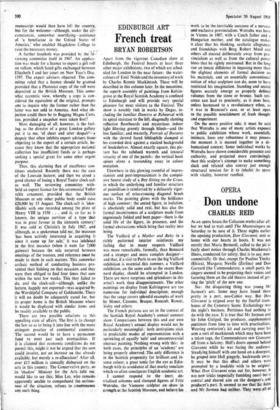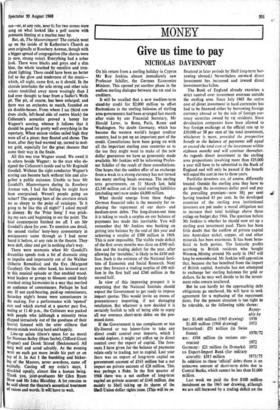Don undone
OPERA CHARLES REID
As-an opera house_the Coliseum works after all; but we had to wait.until The Mastersingers on Saturday to be sure of it. Three nights earlier The opening production, Don Giovanni, sent us home with our hearts in boots. It was not merely that Mario Bernardi, called to the pit at fairly short notice through Charles Mackerras's illness, conducted for safety, that is to say, non- committally. Or that, except for Pauline Tinsley (Elvira), Margaret Neville (Zerlina) and Don Garrard (the Commendatore, a small part), the singers seemed to be projecting-their voices and focusing.them on the old theatre•instead of get- ting the !pitch' of the new one.
No : the disquieting thing was young Mr Jarman's sets. Some may have found these .pretty- in a pert, neo-Cubist way. But Don Giovanni is reigned over by the fearful trom- bones of the Cemetery Scene. Eschatology was the night's business. Prettiness -had nothing to do -with the case. It is true that Mr Jarman and Sir John Gielgud, the producer, supplemented Wiliness from time to time with practicalities. Wearing centurion's kit and carrying over his arm a sort of mackintosh which may have been a token toga, the Commendatore saw Giovanni off from a balcony. Hell's doors opened behind Giovanni while he was facing the audience. Steadying.himself with one hand on a doorpost, he groped into Hell gingerly, backwards away. It may be that this effect and others were prompted by a laudable wish to be original. What Don Giovanni cries out for, however, is not new tricks (especially fumbling ones) but,a central and shared aim on the designer's and producer's part. It seemed to me that Sir John -and Mr Jarman had neither. They were -all at
sea—or, at any rate, near it; for two scenes were sung on what looked like a golf course with pennants hinting at a marina near by.
But, ah, The Mastersingers! The curtain went up on the inside of St Katherine's Church as seen originally at Rosebery Avenue, though with a bigger spread of congregation (the chorus were in sure, strong voice). Everything had a sober look. There were blacks and greys and a dim blue, the whole touched by sensitive and tren- chant lighting. There could have been no better foil to the glow and tenderness of the music— which, all night, came first, as it should. In the chorale interludes the solo string and other solo voices tendrilled away more wooingly than I had ever thought to hear from a Sadler's Wells pit. The pit, of course, has been enlarged; and there was an orchestra to match, founded on six double-basses. From where I sat (third row dress circle, left-hand side of centre block) the Coliseum's acoustics proved a honey for Wagner's scoring, whence it follows that it should be good for pretty well everything in the repertory. When unison violins sailed high they were all of a piece; they floated and shone. The brass, after they had warmed up, turned to mol- ten gold, especially for the great chances that come their way in the finale.
All this was true Wagner sound. We owed it to others beside Wagner: to the man who de- signed the Coliseum's inside and to Mr Reginald Goodall. Without the right conductor Wagner's scoring can become bark without bite and alto- gether a public nuisance. Unable to hear Mr Goodall's Mastersingers during its Rosebery Avenue run, I had the feeling he might have been overpraised. Weren't people going on rather? The opening bars of the overture struck me as sleepy to the point of catalepsy. 'Is it going to be like this all night?' I asked myself in dismay. By the 'Prize Song' I was prick- ing my ears and beginning to see the point. The final counterpoint finished me off. I am Mr Goodall's slave for ever. To mention one detail, the second violins' busy-busy commentary in semiquavers came through as I had never heard it before, at any rate in the theatre. They were deft, clear and got in nothing else's way.
There were moments when Mr Goodall's dreamlike speeds took a bit of dramatic sting or impulse and impetuosity out of the Walther (Alberto Remedios) and the Eva (Margaret Curphey). On the other hand, his leisured start to this musical episode or that enabled wood- wind leaders or groups to blossom amid finely couched string harmonies in a way that merited
an audience of connoisseurs. Perhaps he had one. If not card-bearing, paid-up connoisseurs, Saturday night's house were connoisseurs in the making. For a performance with 'opened' cuts and which started at a quarter past five, ending at 11.40 p.m., the Coliseum was packed with people who (although a minority twice clapped intrusively out of the goodness of their hearts) listened with the utter stillness that denote minds working hard and happily.
Line-up salute (there's space for no more) for Norman Bailey (Hans Sachs), Clifford Grant Vogner) and Derek Stroud (Beckmesser). All sang well and acted adroitly. As the evening went on each got more inside his part or on top of it. In Act 1 the bumbling and bicker- ing of the Masters, never overdone, came off capitally. Casting off my critic's stays, I chuckled openly, almost like a human being. Thank you, joint-producers Mr Qlen Byam Shaw and Mr John Blatchley. A lot remains to be said about the -theatre's acoustical treatment Of voices and words. It will have to wait.



































 Previous page
Previous page